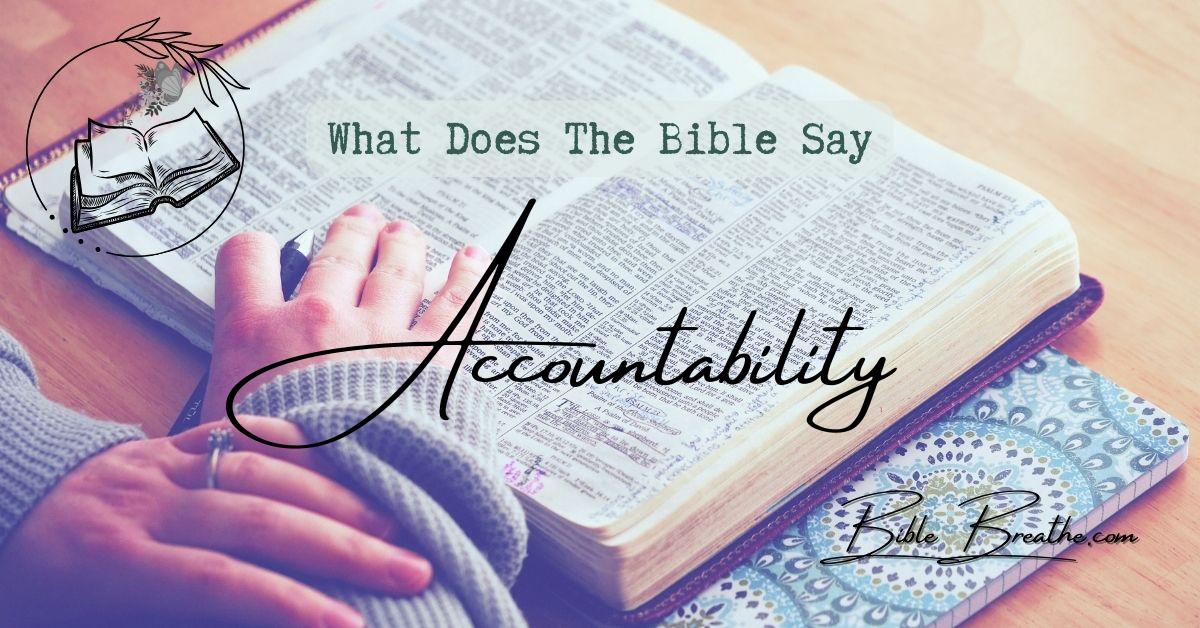What’s the Bible’s take on accountability, fam?
Accountability, it’s like the compass that keeps us on the righteous path.
You see, it’s not about pointing fingers; it’s about checking our hearts, turning back when we’ve strayed, and seeking forgiveness from God and others.
In our Christian journey, accountability is our GPS, guided by the Holy Spirit and lit up with biblical verses.
It’s not a solo mission; we’ve got accountability partners, our spiritual co-pilots, to keep us on track and within God’s boundaries.
So, join me on this journey through the Word, where we’ll uncover the significance of accountability in our spiritual growth and how it’s the key to healing and strong relationships.
God’s grace is waiting, fam, and it’s time we walk in it together!
🙌🏽📖
Key Takeaways
- Accountability is a fundamental aspect of Christian life, encompassing responsibility, transparency, and being answerable for one’s actions and choices, both to God and to fellow believers.
- The Bible emphasizes the importance of personal accountability, urging individuals to take ownership of their behaviors, thoughts, and intentions. It encourages honesty and integrity in all aspects of life.
- Being accountable to God involves recognizing His authority and sovereignty over one’s life. Believers are called to align their actions with God’s teachings and principles, seeking His guidance and forgiveness when they fall short.
- The Bible also emphasizes communal accountability within the body of believers. Christians are encouraged to support and hold one another accountable in love, helping each other grow spiritually, morally, and emotionally.
- Accountability fosters transformation by creating an environment where individuals are challenged to live in accordance with their faith, enabling growth, maturity, and the fulfillment of God’s purpose for their lives. It promotes a life of integrity and a deeper relationship with God and the Christian community.
Navigating Life’s Path with Biblical Accountability
Photo modified by BibleBreathe.com. Original photo by Tima Miroshnichenko on Pexels
Let’s dive into a profound topic today – accountability.
It’s not just some fancy word; it’s like having a trusty compass for our journey of faith.
Imagine you’re trekking through a dense forest, and the trail vanishes into thin air.
Without a compass, you’re lost in the wilderness, unsure of which way to turn.
That’s how vital accountability is in our daily walk with the Lord.
Proverbs 3:5-6 (KJV) paints the picture perfectly:
“Trust in the LORD with all thine heart; and lean not unto thine own understanding. In all thy ways acknowledge him, and he shall direct thy paths.”
See, accountability isn’t spelled out here, but it’s as clear as day.
Acknowledging the Lord in everything we do?
That’s accountability in action.
It’s about saying, “Lord, lead the way,” aligning our steps with His will, and letting Him guide us toward righteousness.
Now, let’s talk about a tough but crucial aspect of accountability – repentance and seeking forgiveness.
Imagine you’ve messed up, hurt someone, and that guilt weighs you down like a ton of bricks.
What’s the move?
You seek forgiveness and make things right.
It’s no different in our relationship with God.
1 John 1:9 (KJV) says:
If we confess our sins, he is faithful and just to forgive us our sins, and to cleanse us from all unrighteousness.
Here, “repentance” and “forgiveness” take center stage.
When we fess up to our mistakes, confess them, and turn away from them, that’s us being accountable to God.
It’s owning our wrongs and seeking His forgiveness.
Now, let’s talk boundaries.
Imagine a caring parent setting rules to keep their child safe.
Similarly, God has set boundaries in His Word to protect us.
Being accountable means respecting these limits and tuning in to the Holy Spirit’s guidance.
1 Thessalonians 5:19 (KJV) reminds us:
“Quench not the Spirit.”
This means we shouldn’t silence or ignore the Holy Spirit’s nudges.
Instead, we should take responsibility for our actions and decisions, staying within God’s boundaries for our own good.
In a nutshell, biblical accountability isn’t just a buzzword; it’s a way of life.
It’s about recognizing the Lord in everything we do, seeking forgiveness through repentance, and respecting God’s boundaries while listening to the Holy Spirit’s guidance.
This kind of accountability is our trusty compass, guiding us through life’s twists and turns and drawing us closer to God’s heart.
Navigating the Biblical Waters of Accountability
Photo modified by BibleBreathe.com. Original photo by Markus Winkler on Pexels
Hey there, friends!
Today, we’re diving deep into the Bible’s wisdom on accountability, and trust me, it’s like setting sail with a reliable compass in the sea of life.
So, let’s hoist our spiritual sails and explore what the Good Book has to say about accountability.
Accountability to One Another: Like Spiritual Workout Buddies
You know how a good workout buddy keeps you motivated?
Well, in the Bible, we’re encouraged to be like iron sharpening iron.
Check out this nugget from Proverbs 27:17 (KJV):
“Iron sharpeneth iron; so a man sharpeneth the countenance of his friend.”
This verse tells us that holding each other accountable is like having a spiritual workout buddy.
When we’re surrounded by fellow believers who lovingly correct and encourage us, our faith muscles get stronger.
Just as iron sharpens iron, we sharpen each other through accountability.
Whether it’s leaders setting the example, spouses dancing in spiritual harmony, friends lifting us up, or prayer partners connecting us to the divine, accountability is a team effort, and together we grow in faith.
The Power of Repentance and Forgiveness: Grace Abounds
Now, let’s talk about accountability, not as a judgmental force, but as a pathway to repentance and forgiveness.
Here’s a gem from 1 John 1:9 (KJV):
If we confess our sins, he is faithful and just to forgive us our sins, and to cleanse us from all unrighteousness.
When we stumble and fall, the Bible encourages us to ‘fess up.
Confess your sins, and you open your heart to God’s forgiveness, experiencing the incredible cleansing power of His grace.
It’s like a spiritual reset button.
The Holy Spirit as Your Guide: Your Divine GPS
Accountability isn’t a solo journey; it’s a partnership with the Holy Spirit, your divine GPS.
Check out this wisdom from John 14:26 (KJV):
But the Comforter, which is the Holy Ghost, whom the Father will send in my name, he shall teach you all things.
When you’re accountable to God through the Holy Spirit, you’re on a path to true righteousness.
The Spirit helps you navigate life’s twists and turns, making those righteous choices.
Setting Boundaries and Seeking Righteousness: Protecting Your Spiritual Journey
Just as a shepherd guards the flock, we’re called to protect our hearts and minds from sinful influences.
As it says in Psalm 101:3 (KJV):
“I will set no wicked thing before mine eyes.”
Setting boundaries is part of accountability, my friends.
By doing so, we uphold God’s boundaries, ensuring that our journey stays on the righteous track.
Conclusion: Accountability is a Way of Life
In the Bible, accountability isn’t just a concept; it’s a way of life.
It’s the loving correction of a friend, the power of repentance, the guidance of the Holy Spirit, and the protection of God’s boundaries.
When we embrace accountability, we sail the path of righteousness, seeking spiritual growth, healing, and a closer relationship with our Creator.
So, let’s be accountable, not just to others but to God and ourselves, as we navigate this beautiful journey called life.
Unlocking the Blessings of Biblical Accountability
Photo modified by BibleBreathe.com. Original photo by Markus Winkler on Pexels
Today, we’re diving into a topic that’s like discovering a treasure chest in your spiritual journey – accountability.
The Bible doesn’t just give us rules; it also shows us the amazing rewards that come with it.
So, let’s open that chest and explore the riches of embracing accountability in our Christian walk.
Think of it like sailing a ship through dangerous waters.
Without a navigation system, you’re adrift, at the mercy of the unpredictable waves.
But accountability?
It’s your guiding star, helping you chart a course towards righteousness.
Romans 13:14 (KJV) paints the picture:
But put ye on the Lord Jesus Christ, and make not provision for the flesh, to fulfil the lusts thereof.
Here, accountability helps you battle against the temptations of sin and set your spiritual course.
When you’re accountable to fellow believers or an accountability partner, they’re like your co-pilots, urging you to stay on course and avoid the traps of the flesh.
Now, let’s talk about recognizing lies and walking in Christ’s obedience.
Picture a detective unraveling a complex case.
They dig deep, sifting through layers of deceit to find the truth.
That’s what biblical accountability does for us.
It helps us spot the lies we might believe and steers us towards obedience to Christ, the ultimate truth.
John 8:32 (KJV) says:
“And ye shall know the truth, and the truth shall make you free.”
Being accountable means chasing after the truth found in God’s Word and aligning our lives with it.
It’s about facing down the falsehoods that could lead us astray and embracing the freedom that comes from walking in Christ’s obedience.
Now, let’s switch gears and talk about personal growth and relationships.
Imagine a garden where a diligent gardener cares for each plant, giving them just the right attention and nourishment.
Well, accountability plays that role in our personal growth and in nurturing healthy relationships.
Proverbs 27:17 (KJV) puts it beautifully:
“Iron sharpeneth iron; so a man sharpeneth the countenance of his friend.”
Your accountability partners and fellow believers are like the “iron” in your life.
They challenge you, uplift you, and help you grow spiritually.
In relationships, accountability builds trust, fosters openness, and offers mutual support, making your connections with others more vibrant and meaningful.
In the end, the blessings of biblical accountability are like gems hidden in plain sight.
It empowers us to conquer sin, set righteous goals, discern truth, obey Christ, and flourish personally and in our relationships.
Just like a compass guides a ship through stormy seas, biblical accountability steers us through life’s challenges, drawing us closer to the heart of God.
So, embrace it, my friends, and let it lead you to the abundant life God has in store for you.
The Freedom Found in Confession
Photo modified by BibleBreathe.com. Original photo by RDNE Stock project on Pexels
Hey there, folks!
Today, we’re talking about a word that carries a lot of weight in the realm of accountability: confession.
It’s like the key that unlocks the door to a whole new level of understanding, and we’re about to dive into what the Bible teaches us about this powerful act.
The Meaning of Confessing Sins: Unlocking Healing
Picture this: James 5:16 (KJV) says,
“Confess your faults one to another, and pray one for another, that ye may be healed. The effectual fervent prayer of a righteous man availeth much.”
Confession isn’t just about admitting you messed up; it’s an act of humility and vulnerability.
It’s about recognizing our imperfections before God and our fellow believers.
Confession is like a two-sided coin.
On one side, it brings us closer to God as we lay our sins at His feet, seeking His forgiveness and grace.
On the flip side, it connects us with our fellow believers, forging a bond through shared struggles and the pursuit of righteousness.
Think of it like shedding a heavy burden.
As you utter your confession, it’s as if the weight of guilt and shame is lifted from your shoulders.
This powerful act not only leads to personal healing but also fosters unity within the body of believers.
The Healing Power of Prayer and Righteousness: A Soothing Balm
Now, when you confess, it often goes hand in hand with prayer, which is like a soothing balm for the soul.
When we confess our sins, we invite God’s healing touch into our lives.
As the Bible says in James 5:16 (ESV):
“The prayer of a righteous person has great power as it is working.”
Righteousness is closely tied to confession.
It’s the path we strive to walk, a commitment to living a life in alignment with God’s word.
Confession is a vital step on this journey, helping us realign our hearts with His will.
Imagine confession as a cleansing rain, washing away the stains of sin and making room for new growth.
It’s an act of surrender, allowing God to prune the branches of our lives so that we can bear fruit in abundance.
Conclusion: Confession Unleashes Transformation
In the Bible, confession isn’t just about admitting guilt; it’s a transformative act that ushers in healing, unity, and righteousness.
As we confess our sins and pray for one another, we tap into the profound power of accountability and the boundless grace of our Creator.
So, my friends, embrace confession as a pathway to healing and a deeper connection with both God and your fellow believers.
It’s a journey worth taking.
Navigating the Scriptures on Accountability
Photo modified by BibleBreathe.com. Original photo by Mikhail Nilov on Pexels
Today, we’re taking a deep dive into the Bible’s wisdom on accountability.
These verses are like precious gems, shedding light on this vital concept and guiding us on our Christian journey.
**1.
Accountability in Confession:** The Bible urges us to be open about our mistakes and sins.
Check out James 5:16 (KJV):
“Confess your faults one to another, and pray one for another, that ye may be healed.”
Here, it highlights the power of accountability partners in the process of repentance and healing.
**2.
God’s Desire for Forgiveness:** When we admit our wrongs, God’s heart is to forgive.
In 1 John 1:9 (KJV), it says:
If we confess our sins, he is faithful and just to forgive us our sins, and to cleanse us from all unrighteousness.
This verse beautifully links accountability, repentance, and God’s gracious forgiveness.
**3.
Accountability to God’s Standards:** Accountability means living by God’s righteous standards.
Look at Romans 13:14 (KJV):
But put ye on the Lord Jesus Christ, and make not provision for the flesh, to fulfil the lusts thereof.
This verse reminds us to make choices that honor God, with accountability as our trusty guide.
**4.
Avoiding Deception:** Accountability keeps us away from deception and falsehood.
Ephesians 5:6 (KJV) warns:
“Let no man deceive you with vain words: for because of these things cometh the wrath of God upon the children of disobedience.”
Stay accountable to the truth of God’s Word, or you might be led astray.
**5.
Mutual Edification:** In accountability partnerships, the Bible encourages mutual edification.
Proverbs 27:17 (KJV) paints a vivid picture:
“Iron sharpeneth iron; so a man sharpeneth the countenance of his friend.”
This verse beautifully illustrates how we can uplift and strengthen each other through accountability.
**6.
Walking in the Light:** Accountability keeps us on the path of righteousness.
1 John 1:7 (KJV) explains:
“But if we walk in the light, as he is in the light, we have fellowship one with another, and the blood of Jesus Christ his Son cleanseth us from all sin.”
Walking in the light, with accountability, ensures we remain in fellowship with God and fellow believers.
**7.
The Holy Spirit as Our Guide:** The Holy Spirit is our ultimate accountability partner.
John 14:26 (KJV) reassures us:
“But the Comforter, which is the Holy Ghost, whom the Father will send in my name, he shall teach you all things, and bring all things to your remembrance, whatsoever I have said unto you.”
This verse reminds us that the Holy Spirit guides us in understanding and applying God’s Word.
As we journey through these verses, it’s clear that accountability isn’t just a concept; it’s a fundamental truth in our Christian walk.
From repentance and forgiveness to living righteously and nurturing relationships, the Bible provides a roadmap for a life filled with accountability.
It’s not a burden; it’s a blessing that empowers us to grow in faith and walk in obedience to our loving God.
Cultivating Accountability Partnerships: The Dance of Grace and Truth
Photo modified by BibleBreathe.com. Original photo by Magda Ehlers on Pexels
Hey there, fellow travelers on the winding road of faith!
Today, we’re talking about accountability partnerships, those trusty co-pilots on your spiritual journey.
Let’s unravel the significance of these relationships and how they beautifully blend grace and truth.
The Beauty of Companionship in Faith
You know what they say, “Two heads are better than one.”
Well, in the Bible, it’s more like “Two are better than one because they have a good return for their labor” (Ecclesiastes 4:9, NIV).
Think of your faith journey as a challenging hike.
Having an accountability partner is like having a fellow hiker by your side, sharing the load.
When one stumbles, the other lends a helping hand, ensuring both reach the summit.
Together, you encourage each other to keep pressing forward.
The Delicate Harmony of Grace and Truth
Now, let’s talk about the delicate balance between grace and truth, which is at the heart of accountability partnerships.
In John 1:14 (ESV), it says:
“And the Word became flesh and dwelt among us, and we have seen his glory, glory as of the only Son from the Father, full of grace and truth.”
Grace, like a gentle breeze, offers forgiveness and understanding when we falter.
It reminds us that we are loved and accepted despite our imperfections.
Truth, on the other hand, is the unwavering anchor that keeps us on the righteous path.
It’s like a mirror that reflects our shortcomings with love and honesty.
Just as a compass points us to true north, truth guides us toward righteousness.
Imagine grace and truth as the two wings of a bird.
To soar in our faith, we need both.
Too much grace without truth can lead to complacency, and too much truth without grace can breed condemnation.
But when we strike that balance, we navigate the skies of faith with grace, humility, and growth.
Conclusion: A Gift from Above
In the Bible, accountability partnerships are truly a gift from God.
They provide support, encouragement, and a safe space for growth.
Just as iron sharpens iron, these relationships help us sharpen our faith.
Remember, on your journey, it’s crucial to find that sweet spot between grace and truth.
It’s in this equilibrium that we find the strength to become better versions of ourselves while growing closer to our Creator.
So, embrace those accountability partnerships and keep dancing to the tune of grace and truth!
Frequently Asked Questions (FAQs) About What Does The Bible Say About Accountability
What does the Bible teach about personal accountability and responsibility?
The Bible emphasizes personal accountability, teaching that individuals will answer for their actions.
It encourages taking responsibility for one’s choices, seeking forgiveness for wrongdoing, and striving to live according to God’s principles.
Are there specific verses in the Bible that address the concept of being accountable for our actions?
Yes, the Bible contains numerous verses about accountability.
For example, Galatians 6:7 states, ‘Do not be deceived: God is not mocked, for whatever one sows, that will he also reap.’ This verse emphasizes the concept that we are accountable for our actions and will face the consequences of our choices.
How does the Bible guide us in being accountable to God and others?
The Bible emphasizes accountability through various teachings.
Galatians 6:1 encourages accountability in helping restore those who have stumbled.
Matthew 18:15-17 advises addressing conflicts directly.
Proverbs 27:17 stresses accountability through mutual correction and growth.
Ultimately, accountability is about responsibility, mutual support, and correction in love, aiming for personal and communal spiritual growth.
Can you find examples in the Bible where individuals were held accountable for their actions, both positively and negatively?
Numerous examples in the Bible highlight individuals being held accountable for their actions.
Adam and Eve faced consequences for disobedience (Genesis 3), and King David faced repercussions for his sins (2 Samuel 12).
These instances underscore the biblical principle of accountability and the moral consequences that follow personal choices.
In what ways does accountability play a role in the development of Christian character and ethics?
Accountability is essential in shaping Christian character and ethics.
It fosters personal responsibility, encourages adherence to biblical principles, and promotes moral integrity.
Being accountable to God and to fellow believers helps maintain ethical standards and spiritual growth.







